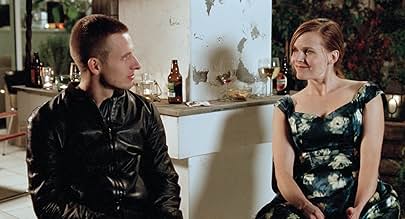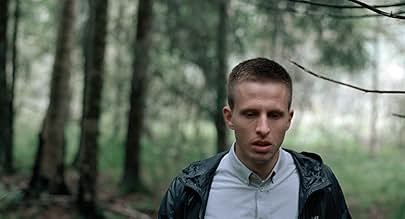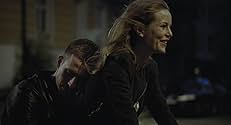IMDb RATING
7.6/10
31K
YOUR RATING
One day in the life of Anders, a young recovering drug addict, who takes a brief leave from his treatment center to interview for a job and catch up with old friends in Oslo.One day in the life of Anders, a young recovering drug addict, who takes a brief leave from his treatment center to interview for a job and catch up with old friends in Oslo.One day in the life of Anders, a young recovering drug addict, who takes a brief leave from his treatment center to interview for a job and catch up with old friends in Oslo.
- Director
- Writers
- Stars
- Awards
- 19 wins & 21 nominations total
Aksel Thanke
- Terapeut
- (as Aksel M. Thanke)
Tone Beate Mostraum
- Tove
- (as Tone B. Mostraum)
- Director
- Writers
- All cast & crew
- Production, box office & more at IMDbPro
Featured reviews
Oslo, October 31st (2011)
A highly realistic, intimate view of a young man who has completed a drug abuse program and is trying to rejoin his life. It's a rough ride, sometimes boring, sometimes raw, but it's the real thing, and if you have an interest in this kind of common problem without watching a documentary, this is the movie.
Though set in Oslo, there is a universal quality to all of this. Yes, the leading man, Anders, has the usual problem getting jobs. But that's just the beginning. It's about friends who want to help and friends who expect him to help them be wild. It's about old girlfriends, new girlfriends, parties where you can't drink, family that wasn't adequate, and on and on.
And the temptation of real drugs, beyond drink.
It's odd to realize, but I think the bottom line is that most young people live in a culture that's on the edge, on purpose and for good reason. And there is a percentage of people who can't handle that, who need to go over the edge, and will always go over the edge. Some of those people understand it early and save themselves, others never can. And life is a series of crises.
This isn't a feel good movie about a man who succeeds (I'm not saying here if he succeeds or not—just that it's not some sunny happiness after a round with the devil). This is about what it might be like to be in the shoes of Anders, or anyone like him, and how almost impossible it is to rise up. And his friends and family are partly to blame, sad to admit.
The final few minutes of the film are poetic—elegiac might be a better word—and the opening to the film is similarly daring and edgy. It's odd and perhaps too bad the the middle—the bulk of it—is more prosaic. It's good, it's really good, but without the poetry we are sure to sink into empathy and sadness, watching what is surely so believable it is, somewhere, all too real.
A highly realistic, intimate view of a young man who has completed a drug abuse program and is trying to rejoin his life. It's a rough ride, sometimes boring, sometimes raw, but it's the real thing, and if you have an interest in this kind of common problem without watching a documentary, this is the movie.
Though set in Oslo, there is a universal quality to all of this. Yes, the leading man, Anders, has the usual problem getting jobs. But that's just the beginning. It's about friends who want to help and friends who expect him to help them be wild. It's about old girlfriends, new girlfriends, parties where you can't drink, family that wasn't adequate, and on and on.
And the temptation of real drugs, beyond drink.
It's odd to realize, but I think the bottom line is that most young people live in a culture that's on the edge, on purpose and for good reason. And there is a percentage of people who can't handle that, who need to go over the edge, and will always go over the edge. Some of those people understand it early and save themselves, others never can. And life is a series of crises.
This isn't a feel good movie about a man who succeeds (I'm not saying here if he succeeds or not—just that it's not some sunny happiness after a round with the devil). This is about what it might be like to be in the shoes of Anders, or anyone like him, and how almost impossible it is to rise up. And his friends and family are partly to blame, sad to admit.
The final few minutes of the film are poetic—elegiac might be a better word—and the opening to the film is similarly daring and edgy. It's odd and perhaps too bad the the middle—the bulk of it—is more prosaic. It's good, it's really good, but without the poetry we are sure to sink into empathy and sadness, watching what is surely so believable it is, somewhere, all too real.
10maddo16
The most hard-hitting and resonant film I've seen in a long time, Oslo August 31st sets itself up with serene, fuzzy home footage and tales of blissful memories spent in the titular city of Oslo only to cut to the bleak life of Anders, a former heroin addict on his first day of life out of rehab. Searching for a meaning and a purpose in this new life he finds little in his friends' bourgeois city routines, which he neither desires nor feels he could achieve anyway, and their claims that "it'll all get better" fail to move a mind constantly probing and analysing the reality of his situation.
He soon undergoes an intense conversation in a park overlooking the city with his closest friend, wherein Anders pours out his thoughts of the time the two have spent apart, and the precision of their rapport matched with the lead's acting make the whole scene feel horribly real.
Anders wanders the often-empty city like a ghost, sitting in a café surrounded by the hollow dreams of others ("Plant a tree. Swim with dolphins. Write a great novel") and dwelling on the weight of his own existence. In two minds whether to leave the city, increasingly desperate and always beautifully shot, we follow him through the night until sunrise, when Anders appears to us in a sequence at his most unpredictable.
Undeniably disturbing, yet intimate and tender, this is a film that already feels close to my heart, one unafraid to bring up difficult questions and brilliantly able to provoke an idea of the absurdity of it all.
He soon undergoes an intense conversation in a park overlooking the city with his closest friend, wherein Anders pours out his thoughts of the time the two have spent apart, and the precision of their rapport matched with the lead's acting make the whole scene feel horribly real.
Anders wanders the often-empty city like a ghost, sitting in a café surrounded by the hollow dreams of others ("Plant a tree. Swim with dolphins. Write a great novel") and dwelling on the weight of his own existence. In two minds whether to leave the city, increasingly desperate and always beautifully shot, we follow him through the night until sunrise, when Anders appears to us in a sequence at his most unpredictable.
Undeniably disturbing, yet intimate and tender, this is a film that already feels close to my heart, one unafraid to bring up difficult questions and brilliantly able to provoke an idea of the absurdity of it all.
The opening and closing minutes of Oslo, August 31rst are peerless filmmaking, a simultaneously nostalgic and disturbing slideshow of images from the titular city, which appears as some kind of larger supernatural entity with a will of its own. The film that they bracket is pretty decent too. It's a quiet slice of cinema verite about Anders, a recovering drug addict.
This isn't your standard AA-approved narrative of redemption, and that's what makes it good. Anders discovers that the world outside is frosty, ambivalent towards him, and most of all banal and meaningless. Of course, the difficulty is portraying banality without being banal yourself, and Trier doesn't entirely succeed here. But it does provide, on top of the more philosophical statement, a great representation of the difficulty of getting back into society after leaving it. Oslo, August 31rst is smart enough to see the social barriers that make the standard addiction narrative so deceitful.
Other than the immediately striking opening, there's nothing overtly impressive about this film. It has its flaws, such as the ending, which seems contrived compared to everything that's come before. But it's a quietly solid picture that certainly deserves a little of your time.
This isn't your standard AA-approved narrative of redemption, and that's what makes it good. Anders discovers that the world outside is frosty, ambivalent towards him, and most of all banal and meaningless. Of course, the difficulty is portraying banality without being banal yourself, and Trier doesn't entirely succeed here. But it does provide, on top of the more philosophical statement, a great representation of the difficulty of getting back into society after leaving it. Oslo, August 31rst is smart enough to see the social barriers that make the standard addiction narrative so deceitful.
Other than the immediately striking opening, there's nothing overtly impressive about this film. It has its flaws, such as the ending, which seems contrived compared to everything that's come before. But it's a quietly solid picture that certainly deserves a little of your time.
'Oslo, August 31' (2011), the second film by Norwegian director Joachim Trier, is inspired by a French novel written in 1931, which was also brought to screen by Louis Malle during the Nouvelle Vague period of his career. Trier, a great admirer of this cinematic current, transplanted the story to the Norwegian capital, which is the favorite setting of his films. In fact, the film opens with an almost documentary journey through the city, with urban sequences associated with the thoughts of its permanent or temporary inhabitants. The city is the background for the lives and problems of those who live in it or pass through it, but it does not play an active role. One of the characters expresses this indifferent relationship with a phrase that can be a motto of the film: 'Society does not save those who want to self-destruct'.
The narrative structure of the film reminded me of the American TV series '24' which was very popular 15-20 years ago. Its hero, played by Kiefer Sutherland, saves the city, America or the world within 24 hours. The hero of Joachim Trier's film, Anders (Anders Danielsen Lie), tries to save himself in the entire interval between two sunrises, and the mission proves to be no less difficult. Anders is nearing the end of a detox cure that has lasted several years. The result of the treatment is fragile. Physically, drug and alcohol addiction seems to have gone away. Psychologically, however, the motivation that makes most people continue to live beyond crises has disappeared - professional ambition, emotions in relationships with women or friends. In addition, the world has moved forward, age is beginning to show signs, friends have established families, years of absence from the CV raise questions when he is trying to get a job. The 24 hours that Anders spent in Oslo, during which he tries to renew contacts with the world from which he was absent, confronts him with the indifference of the surrounding society, all the more so as it is dressed in the velvet gloves of Scandinavian politeness and civility.
'Oslo, August 31' is not a 'feel good' film but rather a 'feel bad' one - melancholic and quite depressing. It was very difficult for me to identify in any way with the hero of the film, maybe because addiction to substances, feelings like uselessness and boredom, and the morals and codes of the world of northern Europe are foreign to me. I appreciated the way 'Oslo, August 31st' is filmed and the acting, especially Anders Danielsen Lie, although I also have a doubt about that. The role in this film is so similar to the one he played in 'Reprise', Joachim Trier's debut film, that I should see another film or more in which Danielsen Lie plays something different to be convinced by the quality and depth of his talent. Joachim Trier is without a doubt a talented director, very connected to what has happened or is happening in world cinema but also very attached to the city of Oslo where the stories in all his films that I have seen so far take place. These movies fall into the category of movies that I appreciate but not of those that I love.
The narrative structure of the film reminded me of the American TV series '24' which was very popular 15-20 years ago. Its hero, played by Kiefer Sutherland, saves the city, America or the world within 24 hours. The hero of Joachim Trier's film, Anders (Anders Danielsen Lie), tries to save himself in the entire interval between two sunrises, and the mission proves to be no less difficult. Anders is nearing the end of a detox cure that has lasted several years. The result of the treatment is fragile. Physically, drug and alcohol addiction seems to have gone away. Psychologically, however, the motivation that makes most people continue to live beyond crises has disappeared - professional ambition, emotions in relationships with women or friends. In addition, the world has moved forward, age is beginning to show signs, friends have established families, years of absence from the CV raise questions when he is trying to get a job. The 24 hours that Anders spent in Oslo, during which he tries to renew contacts with the world from which he was absent, confronts him with the indifference of the surrounding society, all the more so as it is dressed in the velvet gloves of Scandinavian politeness and civility.
'Oslo, August 31' is not a 'feel good' film but rather a 'feel bad' one - melancholic and quite depressing. It was very difficult for me to identify in any way with the hero of the film, maybe because addiction to substances, feelings like uselessness and boredom, and the morals and codes of the world of northern Europe are foreign to me. I appreciated the way 'Oslo, August 31st' is filmed and the acting, especially Anders Danielsen Lie, although I also have a doubt about that. The role in this film is so similar to the one he played in 'Reprise', Joachim Trier's debut film, that I should see another film or more in which Danielsen Lie plays something different to be convinced by the quality and depth of his talent. Joachim Trier is without a doubt a talented director, very connected to what has happened or is happening in world cinema but also very attached to the city of Oslo where the stories in all his films that I have seen so far take place. These movies fall into the category of movies that I appreciate but not of those that I love.
Triers second film in his Oslo trilogy depicts the complexities of how it is to return to a familiar place under different circumstances.
In Oslo, August 31st, we meet Anders (Anders Danielsen Lie), a former drug addict. Anders is on his day out from rehab in Oslo to attend a job interview. Before and after the interview, he takes the opportunity to meet up with friends, and problems left undone.
This is one of the best norwegian films out there, mainly because of how it depicts the urban city life in Oslo, and the challenges which follows a recovering drug addict. As a norwegian and a former Oslo citizen, this film hit me hard. With its social realistic style, this film makes you not just reflect upon the lives of drug addicts through the perspective of Anders, but also life in general through the conversation that Anders has with his friends.
Oslo, August 31st is a socratic masterpiece.
In Oslo, August 31st, we meet Anders (Anders Danielsen Lie), a former drug addict. Anders is on his day out from rehab in Oslo to attend a job interview. Before and after the interview, he takes the opportunity to meet up with friends, and problems left undone.
This is one of the best norwegian films out there, mainly because of how it depicts the urban city life in Oslo, and the challenges which follows a recovering drug addict. As a norwegian and a former Oslo citizen, this film hit me hard. With its social realistic style, this film makes you not just reflect upon the lives of drug addicts through the perspective of Anders, but also life in general through the conversation that Anders has with his friends.
Oslo, August 31st is a socratic masterpiece.
Did you know
- TriviaRenate Reinsve's feature film debut. She had two lines. She would later reunite with director Joachim Trier, as the lead in Julie (en 12 chapitres) (2021).
- GoofsAt the beginning of the film, when he dives into the lake holding a big stone, he is wearing a black jacket, when he emerges from the water he is wearing a white shirt.
- ConnectionsFollowed by Julie (en 12 chapitres) (2021)
- SoundtracksPatch To Lucy
Written by E. Skodvin/O. Totland
Performed by Deaf Center
© 2005 Type Records
- How long is Oslo, August 31st?Powered by Alexa
Details
- Release date
- Countries of origin
- Official site
- Languages
- Also known as
- Oslo, 31 de agosto
- Filming locations
- Henrik Ibsens Gate 36, Oslo, Norway(restaurant where Anders meets his sister's girlfriend)
- Production companies
- See more company credits at IMDbPro
Box office
- Gross US & Canada
- $101,475
- Opening weekend US & Canada
- $9,564
- May 27, 2012
- Gross worldwide
- $1,481,665
- Runtime1 hour 35 minutes
- Color
- Sound mix
- Aspect ratio
- 1.85 : 1
Contribute to this page
Suggest an edit or add missing content

























